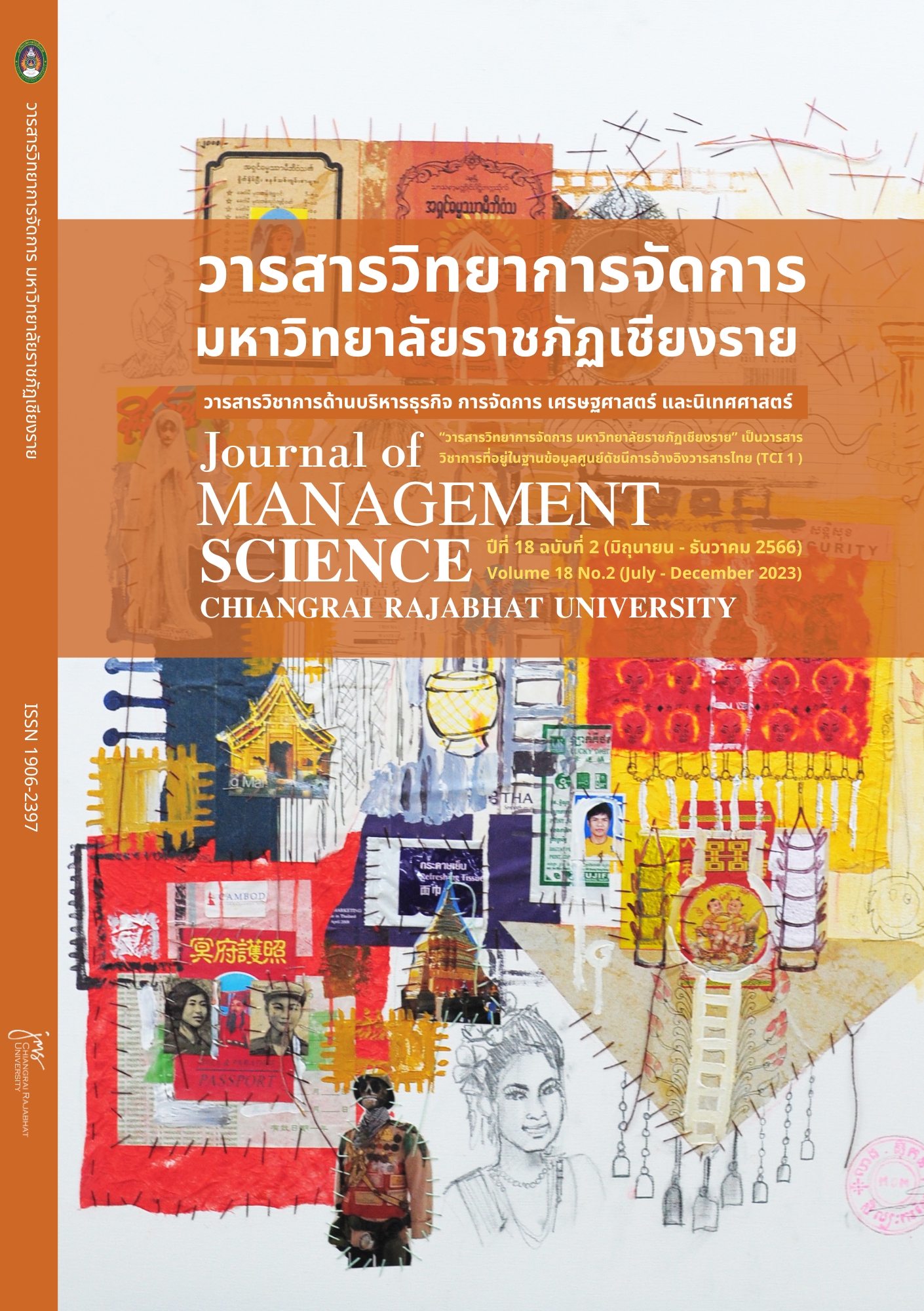ปัจจัยที่มีผลต่อพฤติกรรมการตัดสินใจซื้อสินค้าเกษตรอินทรีย์ของผู้บริโภค ในจังหวัดพะเยา
Main Article Content
บทคัดย่อ
การวิจัยนี้มีวัตถุประสงค์เพื่อศึกษาปัจจัยที่มีผลต่อพฤติกรรมการซื้อสินค้าเกษตรอินทรีย์ของผู้บริโภคในจังหวัดพะเยา ประชากรและกลุ่มตัวอย่างคือ ผู้บริโภคในจังหวัดพะเยา จำนวน 425 คน ด้วยการใช้เทคนิควิธีการเชิงปริมาณ โดยใช้แบบสอบถามเป็นเครื่องมือในการเก็บรวบรวมข้อมูล การวิเคราะห์ข้อมูลด้วยสถิติเชิงพรรณนา (Descriptive Method) โดยใช้ค่าร้อยละ ค่าเฉลี่ยเพื่อนำเสนอข้อมูลทั่วไป และพฤติกรรมการซื้อสินค้าเกษตรอินทรีย์ และทดสอบสมมติฐานด้วยการใช้การวิเคราะห์การถดถอยลอจิสติกทวิภาค (Binary Logistic Regression) โดยใช้การคัดเลือกตัวแปรด้วยวิธีเพิ่มตัวแปรอิสระแบบขั้นตอน (Forward Stepwise Logistic Regression) ผลการวิจัยพบว่า ปัจจัยที่จะส่งผลต่อการซื้อสินค้าเกษตรอินทรีย์ของผู้บริโภคในจังหวัดพะเยาในอดีต ได้แก่ ผู้บริโภคที่มีความรู้และความเข้าใจ
ในสินค้าเกษตรอินทรีย์ มีความเข้าใจและการรับรู้สิ่งแวดล้อมเกี่ยวกับสินค้าเกษตรอินทรีย์ เช่น การรู้จักมาตรฐานเกษตรอินทรีย์ต่าง ๆ จะมีโอกาสซื้อสินค้าเกษตรอินทรีย์เพิ่มมากขึ้น นอกจากนี้หากรสชาติสินค้าเกษตรอินทรีย์ดีกว่า เมื่อเทียบกับสินค้าเกษตรทั่วไปก็ทำให้
ผู้บริโภคซื้อสินค้าเพิ่มมากขึ้น โดยมีค่าความสอดคล้องของข้อมูลและตัวแบบอย่างมีนัยสำคัญทางสถิติที่ระดับ 0.05 พิจารณาจากสถิติทดสอบ Hosmer and Lemeshow ด้วยค่า c2 = 9.029, Sig. = 0.340. ตัวแบบการทำนายถูกต้องในภาพรวมร้อยละ 69.7 นอกจากนี้ปัจจัยที่จะมีผลทางบวกต่อการตัดสินใจซื้อสินค้าเกษตรอินทรีย์ของผู้บริโภคในจังหวัดพะเยาในอนาคต ได้แก่ 1) ประสบการณ์ในการซื้อสินค้าเกษตรอินทรีย์ของผู้บริโภค 2) ความรู้และความเข้าใจในสินค้าเกษตรอินทรีย์ และ 3) คุณค่าทางอาหาร สี กลิ่น รสชาติของสินค้าเกษตรอินทรีย์ ส่วนปัจจัยด้านสื่อสังคมออนไลน์มีอิทธิพลทางลบต่อการตัดสินใจซื้อสินค้าเกษตรอินทรีย์ของผู้บริโภค โดยมีค่าความสอดคล้องของข้อมูลและตัวแบบอย่างมีนัยสำคัญทางสถิติที่ระดับ 0.05 พิจารณาจากสถิติทดสอบ Hosmer and Lemeshow ด้วยค่า c2 = 6.894, Sig. = 0.548. ตัวแบบการทำนายถูกต้องในภาพรวม ร้อยละ 88.4
Article Details

อนุญาตภายใต้เงื่อนไข Creative Commons Attribution-NonCommercial-NoDerivatives 4.0 International License.
ทัศนะและข้อคิดเห็นของบทความที่ปรากฏในวารสารฉบับนี้เป็นของผู้เขียนแต่ละท่าน ไม่ถือว่าเป็นทัศนะและความรับผิดชอบของกองบรรณาธิการ
เอกสารอ้างอิง
Djatmiko, T., & Pradana, R. (2016). Brand Image and Product Price: Its Impact on Samsung Smartphone Purchasing Decision. Procedia - Social and Behavioral Sciences, 219, 221-227.
Janssen, M., & Hamm, U. (2012). Product labelling in the market for organic food: Consumer preferences and willingness-to-pay for different organic certification logos. Food Quality and Preference, 25(1), 9-22.
Jarunsuk, C. (2016). Behavior and Consumption Preferences of Consumers for Safe Agricultural Products in Chom Bung District, Ratchaburi Province. Proceedings of the 4th National Academic Conference of Muban Chom Bung Ratchaburi University. Retrieved from http://rms.mcru.ac.th/publications/25.
Nakharatt, R., & Thongmai, A. (2012). Principles of Marketing (Online). Retrieved November 2, 2021, from www.bbc.ac.th/eBook_files.
National Organic Agriculture Development Committee. (2017). National Organic Agriculture Development Strategy (2017-2021). Retrieved from, https://planning.dld.go.th/th/images/stories/section-5/2560/strategy11.pdf.
Nunnally, J. C. (1978). Psychometric theory. New York: McGraw-Hill Book.
Panpluem, M., & Posunnont, P. (2016). Factors Affecting Willingness to Pay for Organic Agricultural Products by Consumers in the Green Market and Branch Stores in the Bangkok Metropolitan Region and Its Surroundings. Journal of Modern Management, 14(1), 169-178. Retrieved from, http://www.mis.ms.su.ac.th/MISMS01/PDF02/250_20190615_j_71.pdf. (in Thai)
Purichpisittakorn, P., & Siriprasertsin, P. (2019). The Acquisition of Organic Agriculture Knowledge through Online Media and Application of Lecturers and Staff at Maejo University, Chiang Mai Province. Payap University Journal, 30(1), 54-69. Retrieved from, https://so05.tci-thaijo.org/index.php/pyu/article/ view/244166/165867. (in Thai)
Rovinelli, R. J., & Hambleton, R. K. (1976). On the use of content specialists in the assessment of criterion-referenced test item validity. Massachusetts: The University of Massachusetts.
Sereerat, S. (2007). Consumer Behavior. Bangkok: Thira Film and Texts Co., Ltd.
Sirirat, T., & Wimonpan, A. (2020). Marketing Communication Channels toward Consumer Organic Rice Buying Behavior in Thailand. Journal of Mass Communication Technology RMUTP, 5(2), 19-28.
Sukkrarat, K. (2018). Attitudes, Behaviors, and Related Factors of Organic Product Consumers. Retrieved March 20, 2022, from http://ethesisarchive.library.tu.ac.th/thesis/2018/TU_2018_5909034539_9205_10354.pdf. (in Thai)
Suvannarat, W. (2014). Factors Related to the Consumption Behavior of Organic Vegetables by the Public in Songkhla Province. (Master of Business Administration Thesis). Thaksin University, Songkhla.
Tommanee S. (2023). Satisfaction Toward Distribution Channels of Organic Vegetables Through Social Media on Facebook Fan Pages: A Case Study of ABC Organic Farms. Journal of Community Development and Life Quality, 11(2), 135-142.
Wongyot, N. (2021). Factors Influencing the Purchasing Decision of Consumers for Pesticide-Free Vegetables in Phayao Province Market. Humanities and Social Sciences Journal, 5(1), 133-145. Retrieved from https://so05.tci-thaijo.org/index.php/saujournalssh/article/view/253067/171431.
Worapongpat, N., SaintphuKhiao, N., Wongkumchai, T., Muangmee, C., & Limlertrid, T. (2023). Exploring Digital Marketing Strategies on Online Social Media and Developing Brand and Product Labels for Organic Agricultural Products of the Rai Khing Rice Mill Community Enterprise in Nakhon Pathom Province. Journal of Value Chain Management and Business Strategy, 2(4), 61-74.


